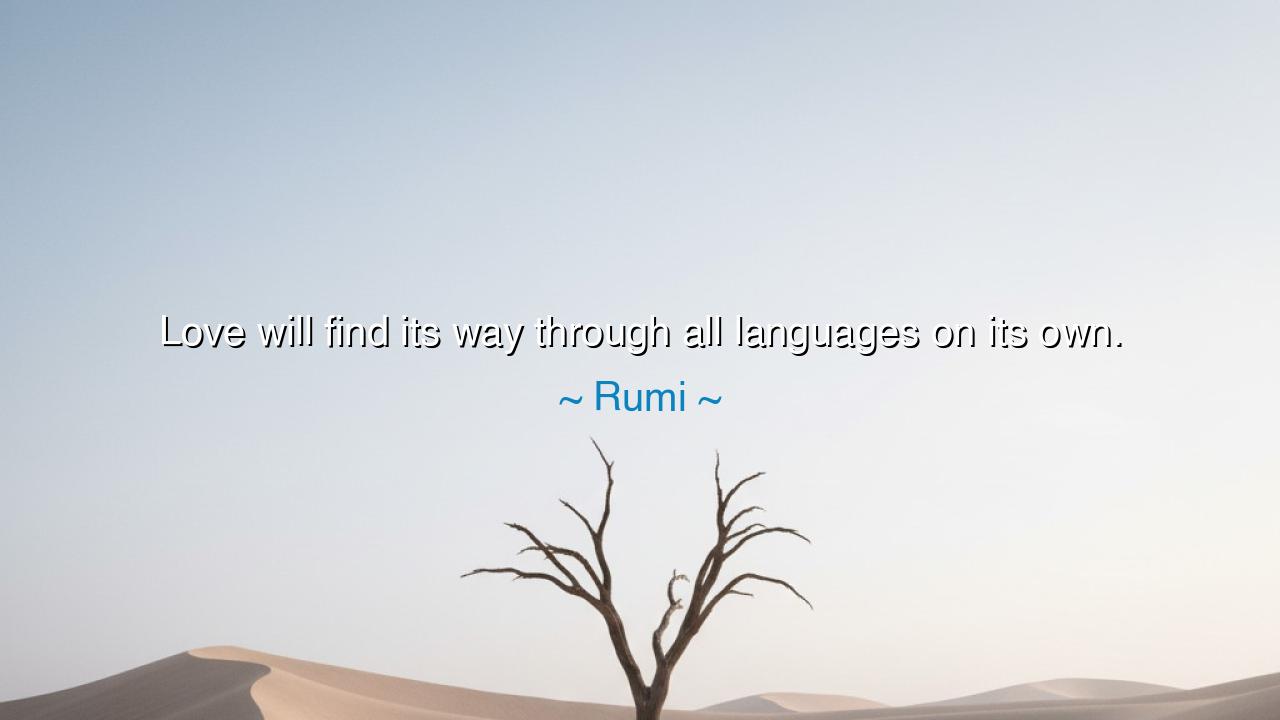
Love will find its way through all languages on its own.






"Love will find its way through all languages on its own." Thus spoke Jalal al-Din Rumi, the mystic of Persia, whose heart burned with divine fire and whose words have crossed centuries like the wind over deserts. In this single line, he captures the boundless power of love—a force that transcends speech, culture, and form. Rumi, who saw God in all creation, reminds us that love is the universal tongue, understood by all hearts even when no words are spoken. For where logic divides and language fails, love remains fluent. It is the voice of the soul that speaks directly to the soul.
The origin of this saying rises from the soil of thirteenth-century Anatolia, where Rumi lived as a scholar, poet, and spiritual teacher. His life was transformed by his meeting with Shams of Tabriz, a wandering mystic who ignited in him a love so vast it dissolved all barriers of intellect and identity. Their bond—beyond words, beyond form—became the birth of Rumi’s divine poetry. He wrote in Persian, yet his verses have been read and sung in hundreds of tongues, for the spirit of love within them speaks to all who have ever longed, suffered, or adored. His words proved his own prophecy true: love indeed finds its way through all languages.
When Rumi says “love will find its way,” he teaches that the essence of love is communication without barrier. The lover does not need eloquence to be understood, nor the beloved translation to be moved. A mother’s touch, a stranger’s kindness, a tear shared in silence—these are the languages of love. Words may change from land to land, but the language of the heart is eternal. Even among enemies, love can whisper; even in the presence of hate, it can be felt. Like water finding its path through stone, love carves its way through every obstacle, unstoppable and sure.
Consider the moment during the Christmas truce of 1914, in the midst of the Great War. Soldiers from opposite sides, divided by language and blood, laid down their weapons on that winter night. They shared bread, songs, and laughter; they buried their dead together; they played football in no man’s land. No translator stood between them, yet they understood one another perfectly, for love and humanity spoke louder than orders and fear. Rumi’s words echo in that moment: love found its way through all tongues, all uniforms, all histories, and for one night, the world remembered its oneness.
For Rumi, love is not merely affection—it is the divine current flowing through all things. It is the source of creation and the bridge between souls. When man loves another, he steps beyond his small self into the vastness of the infinite. That is why Rumi’s poetry, though born in the Islamic mysticism of Sufism, has touched hearts in every faith and culture. Whether read by a Christian monk, a Hindu poet, or an unbeliever gazing at the stars, his words awaken the same truth: that love, in its pure form, belongs to no religion, no nation, no language—it belongs to God.
This truth calls us to live differently. If love can cross tongues, then let no heart remain closed because of difference. Speak kindness even when others do not understand your words. Offer help where there is silence, and peace where there is pain. When you meet another whose language you do not know, let your eyes and smile speak for you; when you encounter someone broken by anger, let compassion answer. Rumi reminds us that love’s speech is made not of words but of presence, patience, and tenderness.
So, my listener, remember this ancient wisdom: love is the one language that needs no translation. Do not let fear or prejudice silence it. Speak it with your hands, your deeds, your eyes, your life. If you pour it out honestly, it will reach where no voice can. For as Rumi teaches, love does not need to be taught—it needs to be released. When you let it flow, it will find its own path, through walls and hearts, across oceans and generations.
And thus, the teaching stands eternal: Love will find its way through all languages on its own, because love itself is the language of God—the first word ever spoken, and the last that will remain when all tongues fall silent.






AAdministratorAdministrator
Welcome, honored guests. Please leave a comment, we will respond soon